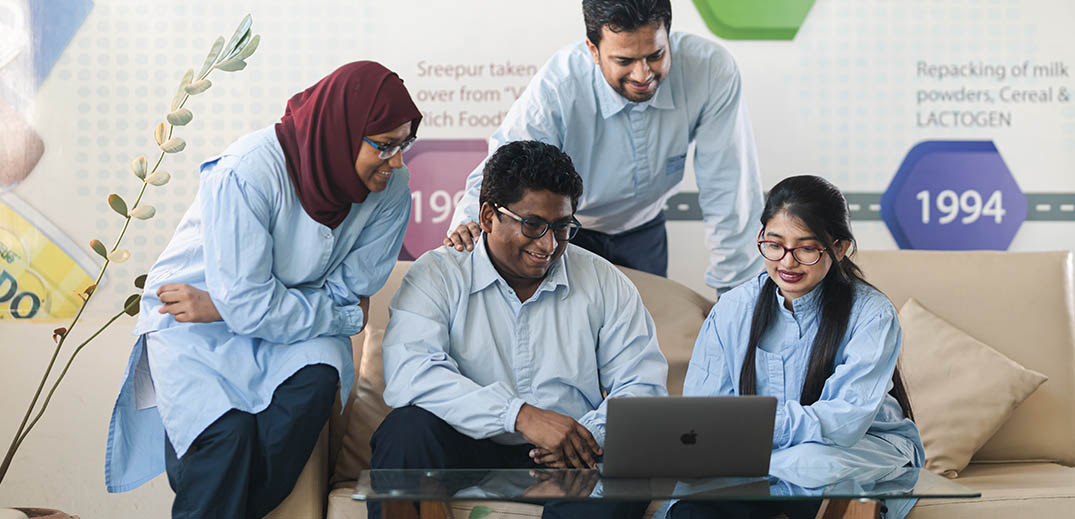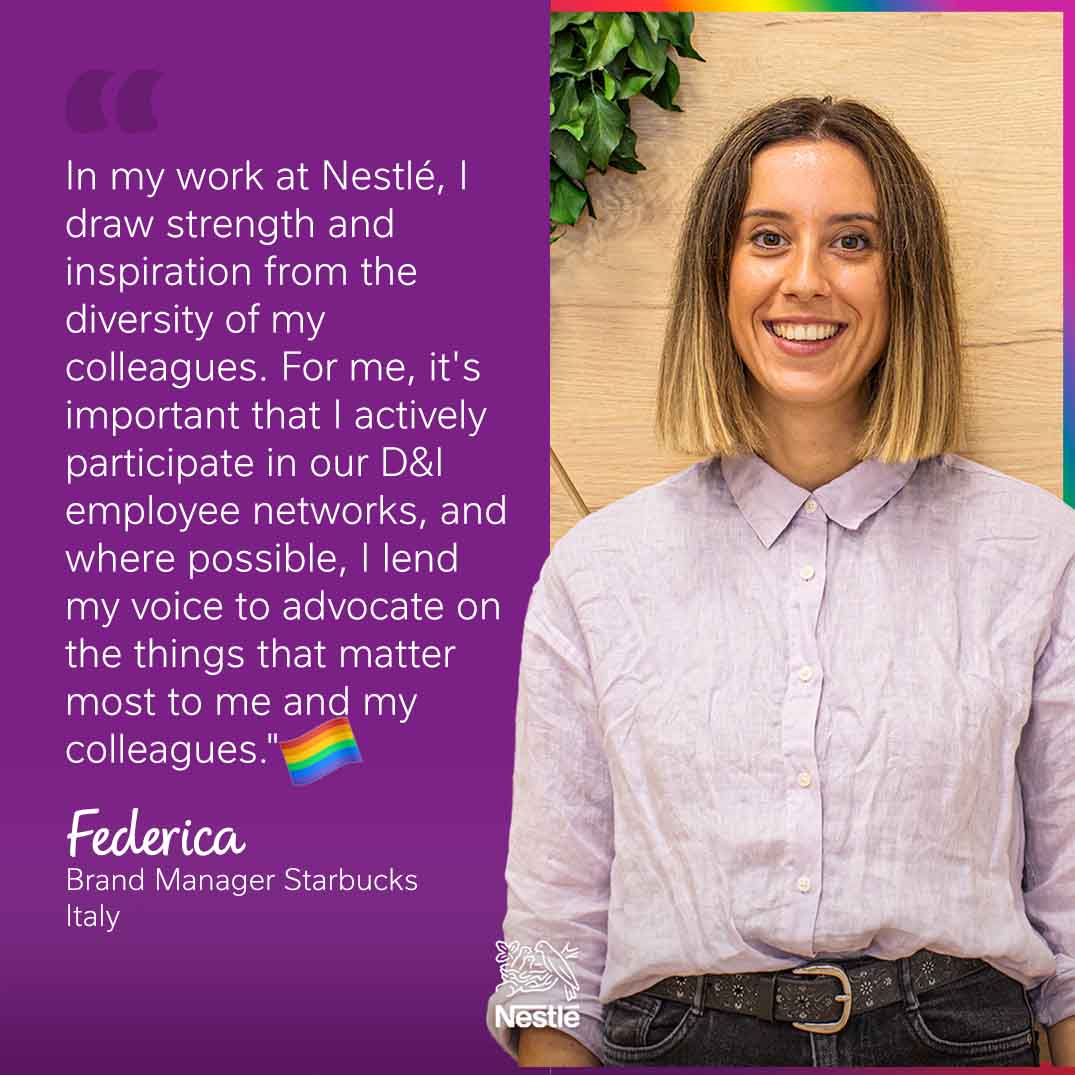Fostering an open and accepting environment for every employee is my top priority at Nestlé and an ongoing effort across our business. We've made strides in establishing a more inclusive culture for our LGBTQI+ employees, and Pride Month brings the opportunity to reflect on key tools to continue to drive progress in our own organization, and more broadly.
A few lessons from our continuing journey stand out.
1. Find the right 'glocal' approach to culture and support
Diversity, Equity, & Inclusion (DEI) is not a short-term strategy or an area that can be taken for granted. It's critical to our values, and it's a competitive necessity. The business case for DE&I is clear. It leads to better innovation, greater employee engagement (pdf, 1Mb), and stronger business performance (pdf, 1Mb).
At Nestlé, we understand this deeply. As a company whose workforce comprises 178 nationalities and around 275,000 employees, we find that barriers to equity, cultural dynamics, and employee needs are widely varied. So, when we look at our DE&I strategy, there is no one-size-fits-all solution. Important moments to reflect, like Pride Month, can look different from one Nestlé market to another. What we prioritize for all Nestlé teams is the end objective: Making sure that LGBTQI+ employees feel supported and empowered at work to be their whole selves. That's why our goals start with a strong foundation.
2. Set a global foundation for inclusion
Working for a global company, our LGBTQI+ employees have varied and diverse experiences, yet our commitment to our values must stay consistent. We've established global policies and standards that seek to tackle discrimination and promote a culture of respect, no matter where we are.
At a global level, that starts with making our own values crystal clear through our global advocacy partnerships as well as company-wide policies. For example, we have supported the UN's Standards of Conduct for Business: Tackling Discrimination against Lesbian, Gay, Bi, Trans & Intersex People since 2018. We also joined PGLE in 2021 (the Partnership for Global LGBTQI Equality), which brings together the private sector and civil society to accelerate social and economic inclusion for the LGBTQI+ community. Around the world, we empower both employees and external partners to report any potential violations of those values through Speak Up reporting. When we develop our own People policies, we aim to build-in equal access in each dimension.
Our gender-neutral Global Parental Support Policy acknowledges and supports diverse family structures by offering equal parental support benefits to same-sex and different-sex couples, biological or adoptive parents, registered domestic partners, legal guardians etc. This policy is implemented in 100% of the countries we operate in along with our policy against discrimination, violence, and harassment at work, reinforcing our culture of respect.
And we know that policies and benefits can only be accessed equally with the support and understanding of leaders, so our policy efforts are supported by actionable trainings on how to mitigate bias and enhance inclusivity in management decisions. Our hope is that setting a core foundation of equity can then support local teams to grow their diversity, equity, and inclusion actions in ways that respond to the local needs and context of their employees.
3. Empower employees to drive local change for local needs
When it comes to more detailed benefits, resources, and support networks, we're committed to giving local teams the opportunity to shine. DE&I efforts rely heavily on prioritizing local employee feedback and insights, usually through employee-led resource groups, as well as partnering with local experts to understand and build on best practices.
In the Philippines, for example, the Nestlé team was one of the first in the country to extend paid parental leave and other family benefits to same-sex partners. Their team took action to look holistically at the full workplace experience and worked with 'Philippine Financial and Inter-Industry Pride' to change workplace facilities, for example instituting gender-neutral bathrooms at all sites. The Nestlé policy supporting all employees who are parents as primary and secondary caregivers exists globally.
Through the locally-targeted resources, our teams can support the needs of their employees. Nestlé UK&I launched a transgender inclusion policy to outline specific steps on supporting employees in transition and to assist in access to resources like financial support for medical costs to transition. And, in Brazil, we offer legal and administrative support to transgender employees who are in the process of recertifying their name and gender. Nestlé USA also offers a platform called Included Health that connects LGBTQI+ members and their parents to culturally competent, quality providers who understand the unique needs of the community.
4. Join with local partners to extend community impact and advocacy
In addition to driving equity within our walls, our local teams and brands are also positioned to partner in the communities where we operate, contributing to broader efforts for change.
For instance, in Canada, KitKat has an ongoing partnership with 'Friends of Ruby', where the packaging of a special edition bar celebrates 'Chosen Family' and all proceeds contribute to mental health support for LGBTQI+ youth. In Brazil, KitKat also prioritized the LGBTQI+ community in its recruitment to offer opportunities for transgender people in the chocolatory boutique.
With deep knowledge of local challenges and dynamics, our teams can drive broader change beyond our own walls and contribute to the shared ambition of inclusivity.
5. Keep an eye on the future, with a focus on employee feedback loops
Both globally and locally, a critical part of our journey is to assess our progress and key actions yet to come. Many business leaders understand that what gets measured gets changed, so we seek to leverage data to better understand the employee experience of individuals from historically underrepresented groups and identify opportunities for improvement.
A key step in this regard is the launch of our voluntary self-ID program in 2022. It aims to empower employees across the Group to identify themselves across gender, gender identity, sexual orientation, race, ethnicity and disability, and more, and will be available in 12 markets to approximately 35% of our employees worldwide by end 2023.
The program will help us gain a richer understanding of the inter-sectional diversity of our global workforce, address inequities and under-representation, develop stronger DEI strategies and resources that meet all employees' needs, measure progress, and create a workplace where all employees can thrive.










